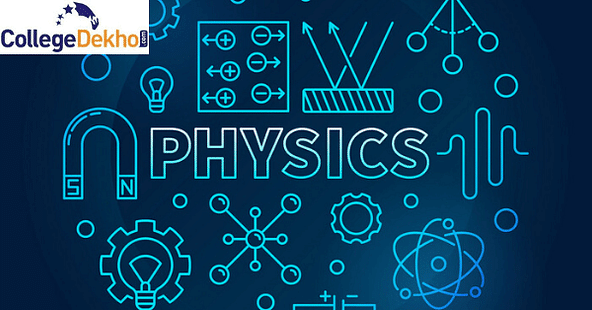BSc Physics is a fundamental course for students who have an interest in Physic subjects. The course prepares students for higher education or lands them on a decent job in a private or government organization. Check the scope of the BSc Physics course here.

Physics is an exciting science subject that generates fundamental knowledge for advancement in technology and research. It is a subject that demands imagination more than reading. In the words of Albert Einstein- “Imagination is more important than knowledge. For knowledge is limited, whereas imagination embraces the entire world, stimulating progress, giving birth to evolution.”
Physics plays an important role in the progress of civilization. The technology which we are using today would not have been possible without traditional and modern Physics. The world needs the support of study and research related to this subject as it brings in technological advancement for the future. Besides, it produces the experts who actually drive a nation’s progress.
Physics, as a subject is correlated with its allied disciplines such as agriculture, environmental sciences, astrophysics, medicine, and cosmology, etc. Hence, with the study of Physics, students can develop a strong understanding of all these subjects of substantial significance. This knowledge and implementation of learning secure modernization of equipment and enhancement of the quality of life. The benefits of Physics, we have discussed so far, elucidate the fact that the study of such a subject of huge importance ensures a great career for an individual.
Also Read: How to Choose the Right B.Sc course?
What is BSc Physics?
BSc Physics is a three years degree programme that comprises theories and concepts in Physics and interdisciplinary subjects like Computer Science and Mathematics. The course emphasizes the concepts of Physics that include modern physics, quantum physics, Classical Mechanic, Relativity, Thermodynamics, Wave Optics etc. It is designed to help students with a good understanding of subjects and also offer them opportunities to work as professionals and researchers in departments that demand a good understanding of physics and its concepts.
Being the most fundamental course in the field of science, BSc Physics deals with the study of matter, energy and their interactions. It is an important course in producing professionals in various fields like engineering, research, medical department, biomedical science, healthcare centers etc.
When deciding to pursue a Bachelor’s degree in Physics, one can get puzzled by thinking what are the career options after BSc Physics. Check the complete article we have presented here to help you to understand the scope and higher education opportunities one can explore after studying BSc in Physics.
Scope of B.Sc Physics
BSc Physics paves a strong ground for students for further studies in physics-oriented courses. It also trains graduates to get entry-level jobs in the private or government sector. Candidates who study BSc Physics degree also gain expertise in lab work through practical sessions and training programmes which help them excel in the workplace.
Students who are creative and have an interest in physics and relevant subjects can pursue a BSc Physics course. It is a good option for those who are keen to study, explore and experiment in fields related to Physics. They can implement their imagination in understanding scientific phenomena and discover methodologies for the benefit of mankind.
After completion of the BSc Physics course, candidates can go for higher education or they can get a job in a relevant field. Read about the higher education and jobs for BSc Physics graduates in the next section.
Also Read: B.Sc Physics Colleges in India
Higher Education after BSc Physics
There are many higher studies options open for a Physics graduate. A Postgraduation course is one of them. Heading towards an MSc course or an MBA could be a very wise decision for a physics graduate. In today’s competitive world, students having higher degrees are accepted with high esteem. Employers seek specialists who possess broadened knowledge and expertise in a specific genre. MSc course in Physics paves that path for the students. It strengthens the existing learning acquired through a BSc course by adding more knowledge to it and also makes the students specialize in their chosen discipline. With the expertise developed by pursuing an MSc in Physics course, students can kickstart their career with high remuneration.
On the other hand, an MBA course can develop leadership quality and managerial skills of a BSc physics graduate which in consequence can help them flourish in their field. Below mentioned are some of the important MSc, MBA, and postgraduate diploma courses that ensure a lucrative career in the field of physics:
Degree | Specializations |
|---|---|
MSc in Physics (Master of Science) | Physics, Applied Physics, Advanced Physics, Biophysics, Optical Physics, Molecular Physics, Geophysics, Nanoscience, Nanotechnology, Atomic & Molecular Physics, Energy Science, Atmospheric Science, Particle/Nuclear Physics, Aeronautics, etc. |
MBA after Physics | Artificial Intelligence, Information Systems,IT Management, Pharmaceutical, Management, Data Science, Information Technology, Energy Management, etc. |
PG Diploma Courses after BSc Physics | PG Diploma in Advanced Physics, Energy Science, Astronomy, Physics & Engineering in Medicine, Space Exploration Systems, Space Science & Technology, Nuclear Medicine Imaging, Optical Technologies |
Entrance Exams to Pursue Higher Education after BSc Physics
There are some entrance exams conducted each year for taking in students for higher studies in physics. In India, students need to appear in national-level entrance tests through which they can take admission to top institutes that offer postgraduation courses in physics. A list of entrance examinations through which students can enroll in a postgraduation degree after BSc Physics is mentioned here
IIT JAM : It is an all- India entrance examination conducted by IITs or IISc on a rotational basis. The exam is conducted for admission in MSc degree course, Integrated courses (M.Sc.-PhD), Dual Degree (MSc.-PhD) or Post-Bachelor's Degree programme at IITs or Integrated PhD courses at IISc.
JEST :Joint Entrance Screening Test (JEST) is an entrance examination conducted by the Science and Engineering Research Board (SERB) for admission to integrated/ PhD courses in the institutes that accept JEST scores. Candidates who hold a BSc degree can take admission to the Integrated MSc course through JEST. Those who hold an MSc degree can apply for the PhD Programme in Physics/ Neuroscience or an integrated PhD course.
TIFR GS: Tata Institute of Fundamental Research (TIFR) enrols admissions in postgraduate courses at the institute through a national-level entrance test. Candidates who hold a BSc Physics degree can take admission in MSc Physics or integrated courses by appearing in TIFR GS entrance test.
Also Read: Top B.Sc course for PCB students
Jobs Roles for B.Sc Physics Graduates
There are various job roles that BSc Physics candidates can opt for after the completion of their studies. Here is the list of some of the job roles available:
Physicist: A Physicist is a person who studies and discovers the interaction of matter and energy. They perform experiments and investigate the theories of Physics to reach a conclusion.
Usually, a PhD holder in Physics becomes a physicist. However, BSc Physics is also eligible to work as a research assistant or technician in a similar field. To secure a job as a physicist, a student needs to go for higher studies in Physics like MSc or PhD.
Physics Lecturer: A candidate with sound knowledge of physics subject can join an institute or academy as a lecturer. It is a decent job role and candidates can expect a good salary as a lecturer. To enter this field of profession, pursuing a master's degree in Physics is key.
Lab Assistant: Candidates who hold a BSc in Physics can work as lab assistants in various firms, clinics or laboratories, or institutes. Such professionals handle technical equipment and act as a helping hand for their supervisors.
Subject Matter Expert (SME): BSc Physics graduates can work as subject matter experts in various organizations. Such candidates are responsible to create content as per the requirement of the client. They are responsible to create effective and format-based content as specified.
Researcher: Candidates who hold a BSc physics degree can apply for researcher or scientist posts at top organizations in India like DRDO, BARC, ISRO, NTPC, BHEL, etc.
Technician: Various private organizations hire candidates with a BSc Physics degree for technical support/ Technician jobs. Candidates can look for vacancies and apply for the same.
Radiologist Assistant: A radiologist is a professional who diagnoses disease and injuries using medical imaging, magnetic resonance imaging (MRI), nuclear medicine, positron emission tomography (PET), and ultrasound. BSc physics graduates can also work as radiologists as they have sound knowledge about the rays, devices, and emissions and can assist effectively in handling the devices used for diagnosis and treatment.
Academic Counselor/ Advisor: The job role of an Academic Counselor/Advisor lies in assisting the students with their queries and guiding them toward the right path in their careers. They also guide them to pursue higher studies and choose the right college. BSc Physics graduates can join a school or an academic institute or college as Academic Counselors provided, they have the required skills in the field.
Hope the above information is useful for the reader. For the latest information, stay tuned to CollegeDekho !
Are you feeling lost and unsure about what career path to take after completing 12th standard?
Say goodbye to confusion and hello to a bright future!

Was this article helpful?


















Similar Articles
Hansraj College CUET Cutoff 2025: Expected Cutoff based on Previous Trends
List of Universities Accepting CUET 2025 Score
CUET Passing Marks for DU 2025: Check Minimum Qualifying Marks
Gargi College CUET UG Cutoff 2025: Expected Cutoff based on Previous Trends
CUET Marks vs Percentile 2025: Marks, Percentile, Rank
TS DOST Admission 2025: Dates (Out), Registration (Started), Web Option (Opened), Eligibility, Documents Required, Fee